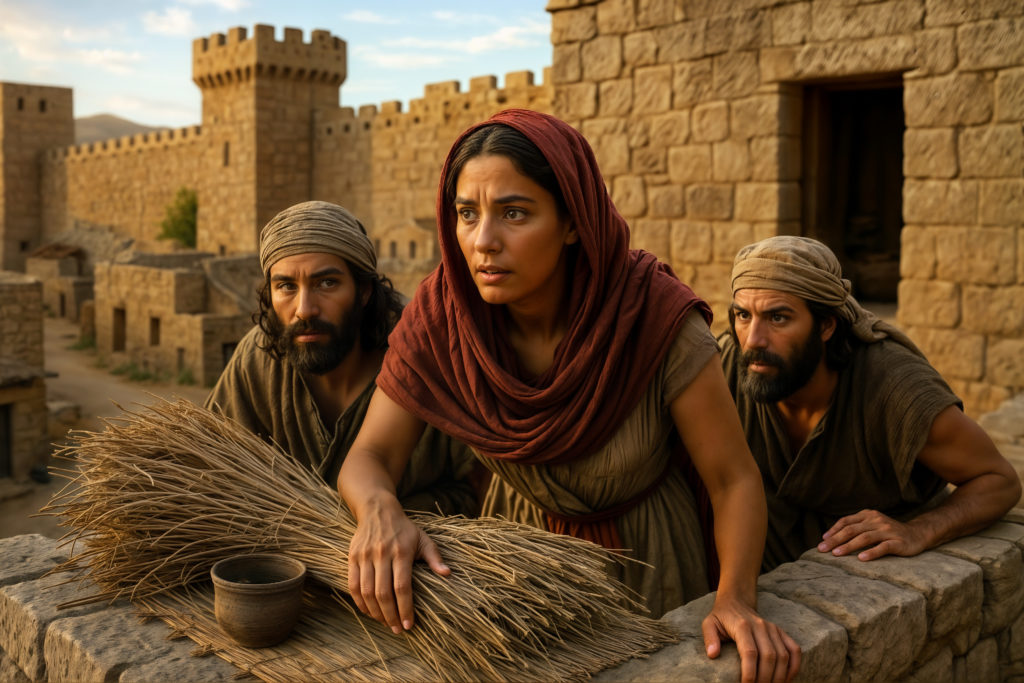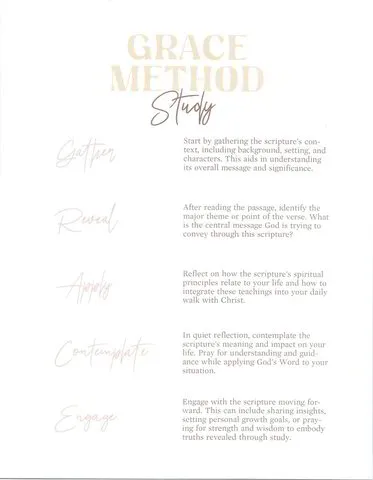What if your greatest shame became the very doorway to your divine purpose? Often, we allow our past mistakes, broken relationships, or shameful moments to define us. We believe the lie that we are too far gone, too damaged, or too unworthy to be used by God. But in the story of Rahab, we are confronted with a truth that challenges every assumption: God doesn’t choose based on reputation—He chooses based on faith.
Her past knew her. In her city, whispers followed her name. Doors may have closed, and judgments came swiftly, but none of that stopped the two strangers who arrived one evening, not seeking pleasure but refuge. Little did Rahab know that hiding those spies would open the door to her own salvation and place her name forever in the lineage of Jesus.
In From Harlot to Holy: The Truth About Rahab’s Shocking Legacy, we explore the life of a woman the world rejected but God redeemed. Rahab’s story reminds us that no label, no sin, and no background can stop God from calling us into something greater. Her legacy isn’t one of disgrace, but of bold faith, courageous action, and generational blessing.
Let her journey speak to yours—because if God can use Rahab, He surely can use you.
Key Scripture:
“Man looks at the outward appearance, but the Lord looks at the heart.” – 1 Samuel 16:7b

Rahab the Harlot: A Shocking Beginning
When Rahab first appears in Scripture, there is no effort to hide her past. Joshua 2:1 introduces her plainly:
“So they went, and came to the house of a harlot named Rahab, and lodged there.” (NKJV)
In a city marked for destruction—Jericho—Rahab’s home was known by what she did, not who she was. Her title wasn’t “mother,” “leader,” or “woman of influence.” She was known simply as the harlot. In the ancient world, this label came with deep shame and societal rejection. Yet this is exactly where God’s story begins—with someone most people would have written off.
The shocking part isn’t just her profession—it’s who she becomes. God doesn’t wait for Rahab to clean up her act. He meets her in the middle of her messy story and invites her into His redemptive plan. Once associated with sin, Rahab’s house becomes a place of refuge for God’s people. Her heart, once far from God, becomes a vessel of saving faith.
This moment shows us something profound: God is not repelled by our past—He is drawn to a heart willing to believe. He specializes in choosing the overlooked, the outcast, and the unexpected.
Supporting Scripture:
“The Lord is near to the brokenhearted and saves the crushed in spirit.” – Psalm 34:18 (ESV)
Rahab’s story reminds us that no one is too far gone for the reach of God’s mercy. Her transformation begins not after she changes her life, but in the midst of trusting God enough to act.
Biblical Parallel – Tamar (Genesis 38):
Like Rahab, Tamar was a woman surrounded by scandal. Her story involves deception, broken promises, and a desperate act that would seem dishonorable to the world. Yet God saw something redemptive in Tamar’s actions. She, too, became part of Jesus’ genealogy (Matthew 1:3).
Just like Rahab, Tamar was misunderstood by people but remembered by God.
Together, their stories show us a truth often missed: God writes His most powerful stories through the lives others would overlook.

Rahab’s Faith: A Bold Belief in the One True God
Rahab’s actions were bold, but what made her truly remarkable was her faith. Long before she was rescued or welcomed into God’s people, she made a confession that revealed the condition of her heart—and it shocked everyone who would have judged her by her past.
As the two Israelite spies hid on her rooftop, Rahab made this astonishing declaration in Joshua 2:11:
“For the Lord your God is God in heaven above and on the earth beneath.” (ESV)
In a city full of idolatry and false gods, Rahab acknowledged Yahweh—the God of Israel—as the one true God. She had only heard about Him—His miracles in Egypt, His victories in battle—but what she heard was enough to produce belief. She didn’t need to witness the Red Sea parting or the manna falling from heaven. Her faith was rooted in what she heard, not what she saw.
Rahab’s faith wasn’t just intellectual—it was active. She risked her life to protect the spies and align herself with God’s people, all before receiving any guarantee of safety. This is the kind of faith that Hebrews 11, the “Hall of Faith,” celebrates:
“By faith the prostitute Rahab, because she welcomed the spies, was not killed with those who were disobedient.” – Hebrews 11:31 (NIV)
She trusted God over her government. She feared the Lord more than she feared the king. Her belief led to action, and her action led to salvation.
Biblical Parallel – The Thief on the Cross (Luke 23:39-43):
Like Rahab, the thief had no religious background. His life was marked by crime and rebellion. Yet, in his final moments, he looked to Jesus and believed. He said,
“Jesus, remember me when You come into Your kingdom.”
And Jesus responded,
“Truly I tell you, today you will be with Me in paradise.”
Neither Rahab nor the thief had time to clean up their lives or prove themselves worthy. They simply believed—and were saved.
Both stories reveal this truth:
God isn’t looking for perfection—He’s looking for faith.

A Holy Legacy: From Scandal to Savior’s Lineage
Rahab’s life didn’t just shift direction—it was completely rewritten. God brought her into the center of His redemptive plan from the shadows of a shameful past. She wasn’t rescued from destruction—she was invited into destiny.
After the fall of Jericho, Rahab and her family were spared, just as she had believed. But God didn’t leave her on the outskirts. She was grafted into His people, His promise, and eventually—His plan to bring forth the Messiah.
In Matthew 1:5, we find her name in the most sacred of lineages:
“Salmon the father of Boaz, whose mother was Rahab…” (NIV)
Once marked by scandal, Rahab became the mother of Boaz, the man who would marry Ruth. Boaz and Ruth would become the great-grandparents of King David, and through that line came Jesus Christ Himself.
What an unthinkable twist: a woman with a stained reputation becomes part of the Savior’s story—not by chance but by divine design.
Supporting Scripture:
“Therefore, if anyone is in Christ, the new creation has come: The old has gone, the new is here!” – 2 Corinthians 5:17 (NIV)
God didn’t hide her past—He redeemed it and displayed it. Her inclusion in Jesus’ genealogy is a permanent reminder that grace doesn’t just erase sin—it builds legacies out of it.
Biblical Parallel – Ruth: The Redeemed Outsider
Rahab’s daughter-in-law, Ruth, was also an outsider. A Moabite widow with no status or claim among God’s people, she chose faith over comfort and declared in Ruth 1:16:
“Your people will be my people, and your God my God.”
Like Rahab, Ruth trusted in the God of Israel and was welcomed into His family. Her union with Boaz—Rahab’s son—produced a lineage of redemption and royalty.
Two women, with painful pasts, were honored by God and chosen to carry forward a bloodline that would change the world.

Closing
Rahab’s story isn’t just about where she came from—it’s about where faith took her. She was once known for her past, but heaven remembers her for her faith. Her life reminds us that God doesn’t call the equipped—He equips the called. No matter your history or the labels the world has given you, God sees your heart and invites you into something greater.
“But God chose the foolish things of the world to shame the wise; God chose the weak things of the world to shame the strong.” – 1 Corinthians 1:27 (NIV)
If Rahab could be transformed by faith, so can you. Your past doesn’t disqualify you—your faith defines you. Let her story stir up hope in your heart and remind you that God specializes in rewriting stories for His glory.
A Prayer of Faith
Heavenly Father,
Thank You for the powerful reminder that no one is beyond the reach of Your grace. Just as You redeemed Rahab from a life of shame and placed her into a legacy of purpose, I trust that You can do the same for me. Forgive me for the times I’ve allowed my past to define me more than your promises.
Create in me a heart of bold faith—faith that acts, faith that trusts, and faith that follows You no matter the cost. Remind me that I am a new creation in Christ Jesus.
“Therefore, if anyone is in Christ, the new creation has come: The old has gone, the new is here!” – 2 Corinthians 5:17 (NIV)
Use my brokenness for Your glory. Turn my scars into testimonies and my shame into a story of redemption. Help me to walk boldly in the truth that I am not who I was, but who You say I am.
In the powerful name of Jesus, I pray
Amen.


